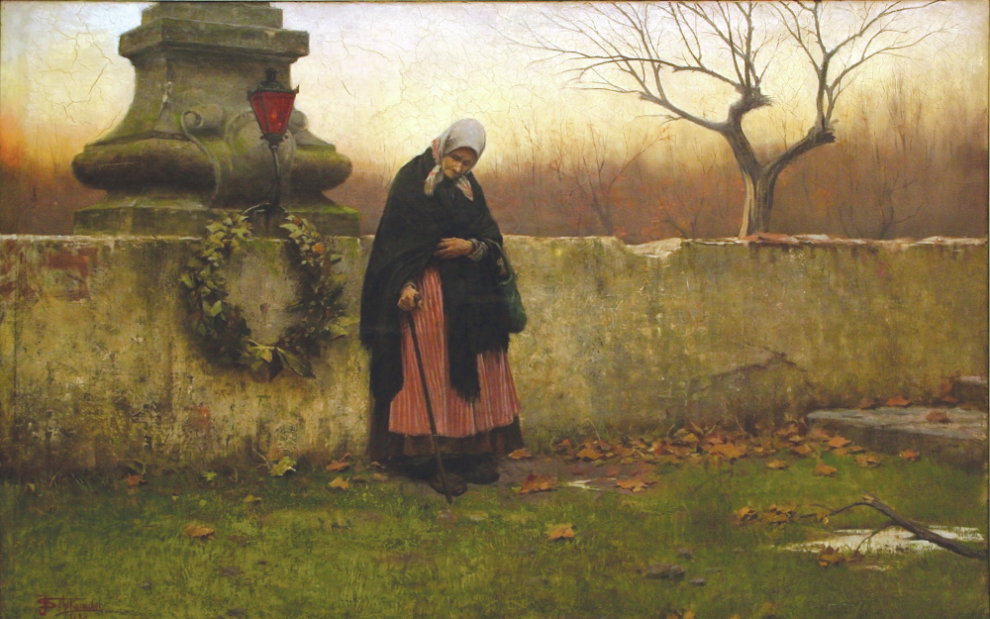But the souls of the righteous are in the hand of God, and no torment will ever touch them. (Wisdom 3:1)
This is the year my mother died. Which makes this All Souls Day feel different for me. While I’ve lost many dear ones through the years, this separation has been the most raw and intimate. Partings can be emotionally costly, but a few seem to take everything we have to survive. I’m not the same person I was before Mom took her leave. Her body was my first address. Without her I feel just a little homeless.
My mother had a long and remarkably healthy life and had no regrets about embracing her endgame. Until she turned 90 she took no pills, was entirely ambulatory, and continued to pass her driver’s exam each year without fail—astonishing her doctor each time and terrifying her children, but you can’t argue with a license. Mom lived alone, in the home she entered at the time of her marriage 75 years earlier, until her final five weeks.
She was a resourceful, funny, strong-willed woman who stuck to her no as resolutely as a 2-year-old. She learned that word after my dad died and the power of no fascinated her. Often she drove her children crazy with her refusals to leave an ancient problematic home and perilous independent situation. Not one of us would have hesitated to lay down our lives for her—yet living with Mom was out of the question. She wouldn’t have it.
Mom told me she was dying in February, but the doctors didn’t tell her that until April. After which my mother entered a season called hospice during April, the month that T. S. Eliot once called the cruelest.
Initially the only difference seemed to be that my eldest sister moved back home with her for the duration; this time Mom didn’t refuse, as the alternative was removal from her house. Mom still rose in the morning, fried herself an egg, and made a pot of percolated coffee for as long as she could. She read the local newspaper on actual paper, watched Mass on TV, and set her hair in pink plastic curlers whenever someone announced they were coming to see her “one last time.” She dressed up and posed for final photos with each visitor, thinner and more fragile in each one. Then, after a quick rollercoaster of abrupt declines and inconceivable recoveries, Mom breathed her last at the beginning of May. At home. The way she wanted it.
When I learned in the early morning hours that my mother was gone, I was 2,000 miles away. An old Three Dog Night song played in the back of my head on a continuous loop: I’ve got pieces of April, it’s a morning in May. Our last conversations, exchanged by phone from Mom’s deathbed, had been lightly laced with morphine, her sincere faith, and her lilting laugh. I’m going home, she kept reminding us if we betrayed distress. My mother never doubted that God is good, that she was forgiven all her trespasses, and that she was floating like a feather toward a realm much kinder than the one she was shedding with every pound that melted from her failing 96-year-old body.
As church, you and I together are within the final weeks of a jubilee year that summons us to hope. Hope was tricky for my family as we scurried around that deathbed, some of us physically and others spiritually. We were all losing a different mother, of course. Among my eight siblings and I, some of us knew Mom as a young woman and others were teenagers when Mom was in her 60s.
I recognize now that in 40 years of childrearing, our mother was learning how to be herself at the same time she was figuring out how to be a wife and mother. Needless to say, there were holes in her performance. Some of us fell through them here and there, with varying levels of reconciliation about what had been missed.
In those last weeks of her life, we siblings fought fierce battles about the meaning of our mother’s dying and what should happen next. When we stood together in the pew at the funeral, it was quite clear we each mourned a different woman: the mother we had, or the mother we needed. That mourning ran the range from sadness, love, anger, to a numbness that might have seemed like indifference to a disinterested observer. So it is, I suppose, with every loss.
All Souls Day is our annual reminder to pray for the dead. But it is also a time to consider what part of ourselves may still be engaged in the many-faceted mourning process. What do we want of these souls who have gone before us, and what might they need from us? Christians profess that death is merely a doorway. Catholics further believe there’s still time to make an exchange of graces and confessions through that doorway. Our conversation across eternity isn’t over. There can be repentance, forgiveness, and a movement toward real peace even after death seems to put an end to second chances.
We often hear that there’s no time like the present—by which we mean now is the hour to act and effect change. It’s also true that there’s no time like the past, with all of its joyful memories, formative experiences, not to mention its wounds and regrets. Catholic teaching suggests that the past is not an immutable reality, but a vital time as susceptible to transformation as the present, and as much in our hands as the future.
Praying for the dead is one essential way we are opened to that fresh realm of possibility. We pray that those who have died will complete their journey toward Absolute Loving Presence. For all of us this journey requires a process known as purgation: simply the purging of whatever is not love so that standing in the presence of All Love will be possible. As visionary St. Catherine of Genoa wrote in her insightful Treatise on Purgatory, purgation isn’t about punishment or suffering, but is rather a desirable purification of our hearts for the full reunion with Love itself. We long for such a purging, to surrender the heavy dross of personal failures so as to reclaim the sweetness of a light and free spirit. To be, as Hildegard of Bingen expressed it, a feather on the breath of God.
Those who die generally leave a certain amount of unfinished business: relationships unrepaired, words left unsaid. Intercession for the dead is a kind of currency that passes through the porous boundaries of eternity to assist and encourage those who’ve died to get where they’re going. And as they do, so can we. So, while praying for our loved ones who were living saints to us is agreeable and good, praying for enemies and adversaries is an even more powerful work to engage. The more difficult our relationships with the deceased were and are, the more urgent is our responsibility to intercede on their behalf.
Before she died, I got to tell my mother she was everything I needed her to be. I meant that. She was my friend and confidante, lifelong champion and place of deepest rest. I pray for her now as a way to continue our happy conversation and communion. I pray as well for others with whom the troubling aspects of our old sparring never seem to end. I know they need these graces. So do I.
This article also appears in the November 2025 issue of U.S. Catholic (Vol. 90, No. 11, pages 47-49). Click here to subscribe to the magazine.
Image: Wikimedia Commons















Add comment